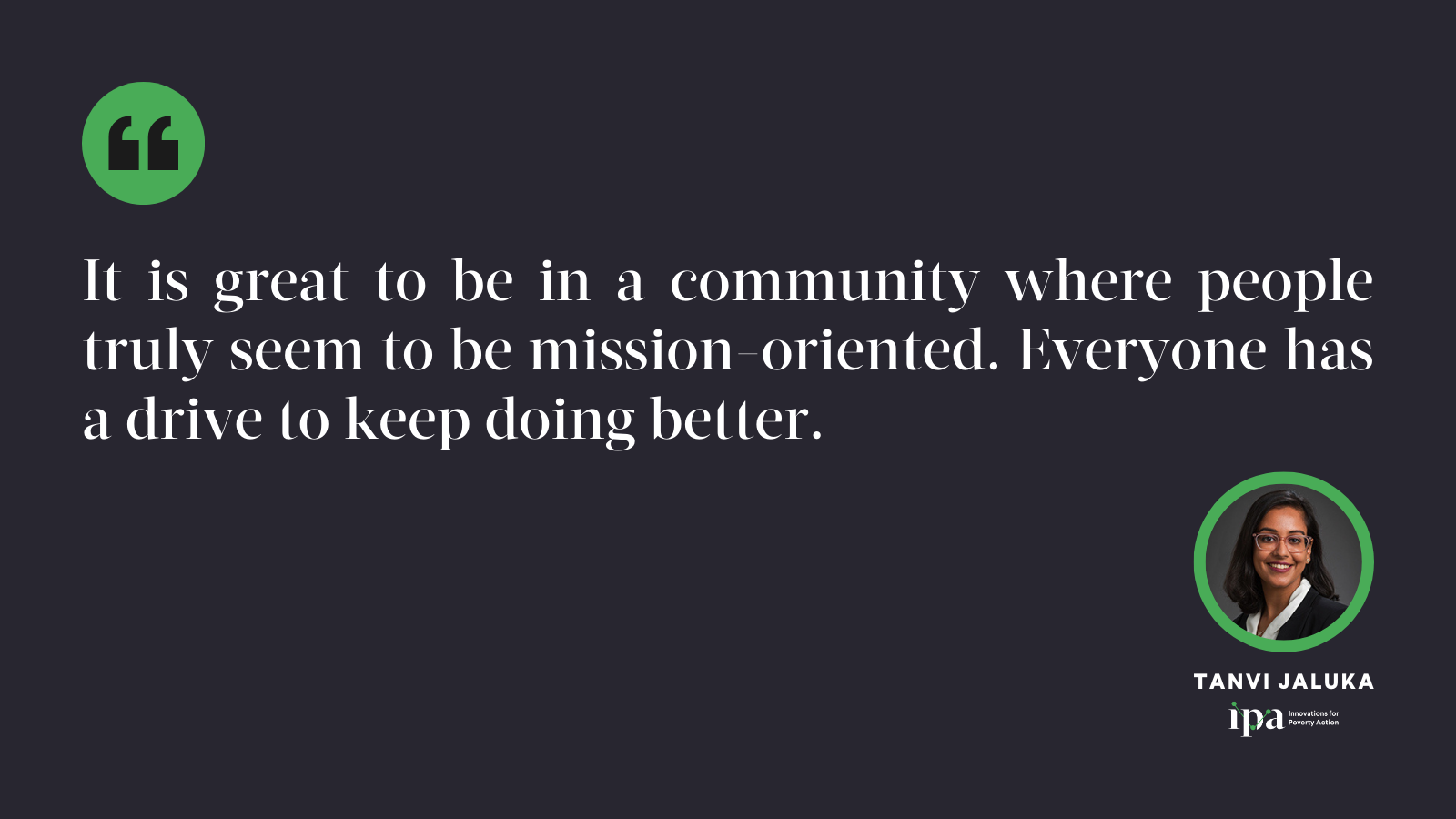Tanvi Jaluka: A Drive to Keep Doing Better
To mark its 20th anniversary, Innovations for Poverty Action created People of IPA, a series of profiles celebrating IPA’s diverse staff, highlighting their contributions, and discussing how and why they seek to improve the lives of those living in poverty. Tanvi Jaluka is an expert on women’s financial inclusion and a program manager for IPA’s Financial Inclusion Program.
Tanvi Jaluka knew that she wanted to improve the world around her. But she wasn’t sure how—until she encountered IPA.
“I was always interested in working on issues related to poverty alleviation,” she says. “But at times, these issues felt really unsurmountable and overwhelming to me.”
In college, Tanvi read Poor Economics by MIT professors Esther Duflo and Abhijit Banerjee, whose ideas laid the foundation for IPA and its sister organization, J-PAL. For the first time, she says, she was able to consider poverty “in a structured and policy-minded way.”
“That quantitative method of thinking really stuck with me. It made me feel that if we can generate strong evidence on issues, we’ll be much more effective and targeted in the work we do.”
She went to graduate school determined to study evaluation methods and one day work with IPA or J-PAL.
Today, Tanvi is a leader within IPA’s Financial Inclusion Program, where she works to help low-income people - especially women - better save and borrow money, make and receive payments, and manage financial risk. In her previous role, with the Program Design and Evaluation Lab at the University of California San Diego, her responsibilities included managing and designing randomized controlled trials - the research process at the heart of IPA’s work.
Working at IPA combines learning and doing. Staff has access to resources that help them grow professionally, but Tanvi found that even informal conversations with her colleagues gave her a deeper understanding of the topics she covers.
“It doesn't feel like you’re just running models and equations. I'm in an environment where people not only have knowledge of quantitative research but also lived experience that they bring to the job,” she says.

She especially values the contributions of IPA’s 20 country offices, whose colleagues help her to see familiar issues in new ways.
“Their insights are just so amazing,” she says. “I've studied and worked on some of these issues from a theoretical perspective, sitting in Washington, D.C, but our colleagues are spread out globally, and regularly interact with policymakers and beneficiaries in the countries we work in. I think that's something unique about IPA.”
Tanvi joined the organization during the COVID-19 pandemic, so her face-to-face contact with colleagues was limited at first. At one in-person meeting, she says, “we went around and shared stories about why we're at IPA.”
“Their stories were a little bit different,” she says. “But the common thread was very similar. It was that in some form we all had a confrontation with structural inequity, and understood that global inequity affects our day-to-day lives.”
“My colleagues have a need to be effective in the work that we do - and make sure it has the biggest impact,” says Tanvi. “It is great to be in a community where people truly seem to be mission-oriented. Everyone has the drive to keep doing better.”
Tanvi believes that her colleagues’ commitment to self-improvement is also reflected in IPA’s staff culture and organizational strategy. She sees this shared purpose as a link between diversity, equity, and inclusion at IPA and its larger mission.
“If we're not actively pushing for DEI at our own organization,” she asks, “then how can we say that we're working towards social justice or equality for others?”











